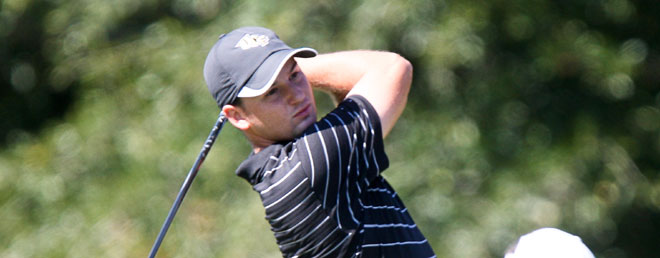UCF’s Schneider Recipient of David Toms Award

ORLANDO – Brad Schneider of UCF has been named recipient of the David Toms Award. The Toms Award is presented to a men’s collegiate golfer who has overcome adversity to achieve collegiate excellence.
The day before Thanksgiving in 2006 - just a couple of weeks after deciding to sign with UCF - Schneider was playing a game of pick-up football when he was pulled down from behind by his shoulders and his right leg caught awkwardly behind him. The right side of his shoe came within inches of his face and Schneider knew instantly something was wrong. After paramedics arrived on the scene they explained Schneider has fractured his right femur. It was last day for the next six months that Schneider was able to walk on his own two feet without assistance.
Surgery was the next day and a procedure scheduled to last three to three-and-half hours lasted over eight. The night of the surgery Schneider began to complain of pain in his lower left leg, opposite of his original injury. The next morning doctors discovered he had developed Compartment Syndrome. Compartment Syndrome is a pressure build-up of fluids and air in the compartments of your muscles and can cause serious damage to muscle, tissue and nerves in which it develops.
Five more surgeries occurred over the next eight days, the first being a double fasciotomy - foot-long incisions to release the pressure built up in Scheider’s lower left leg. The pressure killed approximately 80 percent of the muscle and tissue and the perennial nerve was also permanently severed. The perennial nerve is the nerve that runs from your knee down to your ankle and is responsible for telling your brain to fire the muscles that control foot movement.
After three-and-half weeks in the hospital Schneider dropped from 150 pounds to less than 100 due to a lack of appetite caused by three different types of pain medication. His injuries kept him in a hospital bed for four months but with his mother being a registered nurse Schneider was transferred home by ambulance after a month.
It took another two months for the wound vacuum to shrink and clean out all of the dead tissue from his leg. A plastic surgeon closed the wound by skin graft. Finally after four months Schneider was able to get out of his hospital bed and sit in a chair in his family’s living room. Two months later he learned to walk again. Eight months after his injury he was able to step foot on the golf course and chip and putt.
After months of doubt of whether he would be able to walk or play golf again Schneider felt he had left the bad news in his life behind. However, around the same time he made his way back to the golf course he learned his mother had been diagnosed with cancer and given six months to a year to live. The pain of watching his mother suffer was much worse than the physical pain he had endured. His mother would battle cancer for two years. The summer before his sophomore year both his mother and grandmother passed away in the same week.
After learning to walk again Schneider attended physical therapy every other day and after a year finally played his first round of 18 holes of golf during his freshman year at UCF. Using a golf cart at Rio Pinar Country Club, he was able to post two-under 70. This gave him the confidence that he could come back and be competitive in college golf.
Schneider has played in every tournament for UCF in his four-year career. He helped lead UCF to NCAA regionals four times. He was named to the Conference USA All-Freshmen Team and was All-Conference USA Second Team three times. So for his senior season he has five top-20 finishes and earned medalist honors at the Northern Intercollegiate.
"This award is a great honor and very meaningful to me. It is really neat to be recognized along with such a great player and person in David Toms and I would like to thank him and the GCAA greatly for this award," said Schneider. "None of this would be possible without the support from my family, friends, coaches, and teammates and I want to thank them greatly for their belief in me throughout my collegiate career.”